



This is the Life! Now this is what I call living! How many of us can remember the last time we said or thought something like that? Can you give me a word or a phrase that describes a moment or scenario that would elicit that kind of response?
Some of the descriptions others have given about the good life include: Being financially independent and secure; winning the lottery and/or not having to work; being able to just pick up and go – travel to anywhere, anytime; pleasure and satisfaction 24/7; and similar states of euphoria and perfection. One of my millennial friends said she thought a good life was different than the good life, where the former was all about quality, and the latter was more concerned with quantity. So I asked her if that meant it was possible to be poor and have a good life. That set her thinking. What do you think?
 Our society is mired in materialistic values. Thanks to the capitalist foundation, upon which the hypothetical American Dream is built, our culture makes it seem only natural for us to think of the good life as something we deserve. Our commercials and advertisements faithfully and feverishly indoctrinate us in this kind of entitlement. Small wonder then that we spend so much of our lives, our time, energy, and resources in pursuit of those moments when we can look around and say – yep, this is the life! This entitlement ideology is what theologian, Walter Brueggemann, might call the dominant consciousness. That prevailing way of being, where we are numbed and satiated by consumerism. Brueggemann challenges preachers to counter this dominant consciousness with what he calls an alternative consciousness.
Our society is mired in materialistic values. Thanks to the capitalist foundation, upon which the hypothetical American Dream is built, our culture makes it seem only natural for us to think of the good life as something we deserve. Our commercials and advertisements faithfully and feverishly indoctrinate us in this kind of entitlement. Small wonder then that we spend so much of our lives, our time, energy, and resources in pursuit of those moments when we can look around and say – yep, this is the life! This entitlement ideology is what theologian, Walter Brueggemann, might call the dominant consciousness. That prevailing way of being, where we are numbed and satiated by consumerism. Brueggemann challenges preachers to counter this dominant consciousness with what he calls an alternative consciousness.
One of the many reasons we gather weekly as people of God is to remind ourselves that even as we function day by day within this dominant consciousness of materialism, we are a community with alternative values, grounded in the heart of God. God, whose intention for all of creation from the very beginning has been good. But God, who is good, gets to define good. And thanks to Jesus and his teachings we have several illustrations of this good life. He called it the Kingdom/Realm/Reign of God.
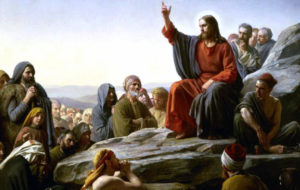 That parable of the two builders, that was read for us this morning, summarized a lengthy set of teachings Jesus gave to his disciples on what life in this kingdom or realm was like. If you have read Matthew 5, 6, and 7 you have either struggled bravely to keep up with its demands, or else you have rationalized it away – far away. Christians have asked, Are we really supposed to live like this? Well let’s take a quick look, since these are the sayings, which, according to Jesus, the wise builder heard and did. It begins with the beatitudes – the blessing statements. That word blessed conveys the idea of being fortunate or happy, so happy as to be envied actually. But the blessings that make us enviable are different – there’s nothing in there about beaches or cruises; no talk in these beatitudes about wealth, fame or fortune. Instead Jesus calls blessed those who are poor in spirit, those who mourn, those who are meek, the peacemakers, the merciful, the pure in heart, and so on – When we look up the word good or happy in God’s dictionary, this is the stuff we find. That’s pretty radical.
That parable of the two builders, that was read for us this morning, summarized a lengthy set of teachings Jesus gave to his disciples on what life in this kingdom or realm was like. If you have read Matthew 5, 6, and 7 you have either struggled bravely to keep up with its demands, or else you have rationalized it away – far away. Christians have asked, Are we really supposed to live like this? Well let’s take a quick look, since these are the sayings, which, according to Jesus, the wise builder heard and did. It begins with the beatitudes – the blessing statements. That word blessed conveys the idea of being fortunate or happy, so happy as to be envied actually. But the blessings that make us enviable are different – there’s nothing in there about beaches or cruises; no talk in these beatitudes about wealth, fame or fortune. Instead Jesus calls blessed those who are poor in spirit, those who mourn, those who are meek, the peacemakers, the merciful, the pure in heart, and so on – When we look up the word good or happy in God’s dictionary, this is the stuff we find. That’s pretty radical.
 I mean, these sayings, or teachings of Jesus talk about some rather difficult things: keeping all of the commandments, what counts as murder or adultery, grounds for divorce, and loving our enemies. What’s so good about this, many have asked, and, finding no answer, they have closed their Bible and put it on a shelf, right next to their volume of Shakespeare’s works. But wait, what about the instructions for how to give to the needy, how to pray, how to forgive, and how to fast? What about the teaching on worry, and not judging others? Yes, I’ll be among the first to acknowledge that, taken as a whole, these teachings set an impossibly high ethical bar. But may I share with you something I learned as a young Christian? I think it may have been my own Dad who shared this with me as a teenager. “Catherine,” he’d say, “there’s enough of what God has said in God’s word for you to spend your entire lifetime working on. Some of it you’ll take to naturally, some of it you’ll need a little extra courage and faith to follow, and some of it you may never understand; but there’s enough for you to at least begin. Work on the parts you understand and trust God to help you grow into the rest.” I can say with gratitude today this has proven to be some of the best advice I’ve listened to, because like any rationally developing adult, there are some things only growth in the faith can help us fully understand. Like God’s goodness in the midst of an evil world. (Don Brash is really good at explaining this by the way…)
I mean, these sayings, or teachings of Jesus talk about some rather difficult things: keeping all of the commandments, what counts as murder or adultery, grounds for divorce, and loving our enemies. What’s so good about this, many have asked, and, finding no answer, they have closed their Bible and put it on a shelf, right next to their volume of Shakespeare’s works. But wait, what about the instructions for how to give to the needy, how to pray, how to forgive, and how to fast? What about the teaching on worry, and not judging others? Yes, I’ll be among the first to acknowledge that, taken as a whole, these teachings set an impossibly high ethical bar. But may I share with you something I learned as a young Christian? I think it may have been my own Dad who shared this with me as a teenager. “Catherine,” he’d say, “there’s enough of what God has said in God’s word for you to spend your entire lifetime working on. Some of it you’ll take to naturally, some of it you’ll need a little extra courage and faith to follow, and some of it you may never understand; but there’s enough for you to at least begin. Work on the parts you understand and trust God to help you grow into the rest.” I can say with gratitude today this has proven to be some of the best advice I’ve listened to, because like any rationally developing adult, there are some things only growth in the faith can help us fully understand. Like God’s goodness in the midst of an evil world. (Don Brash is really good at explaining this by the way…)
Among the several perspectives of life in God’s kingdom or realm, there is one bedrock aspect of this good life I’d like us to stay with just a bit this morning. Nothing you haven’t heard before, but maybe you didn’t know when you heard it that this was the life! Remember in the creation story there was one thing God said was not good? God had said let there be light – God saw that the light was good. God made the dry land and the waters, and saw that it was good. God set the lights in the sky to give light upon the earth – and God saw that it was good. God filled the air, the waters and the land with living creatures of every kind – “I like this,” God said, “this is the life!” Finally God stepped back and surveyed everything and said, “Awesome – this is VERY good!” But then over in Genesis 2, we hear God saying, “Uh-oh, this is NOT good. “It is not good that the man is alone, I will make a helper suitable for him.” What’s so bad about being alone? I hear my introvert friends asking. Because the God in whose image we were made is a God of community. A God who, according to our understanding, is represented by a community of three, which has opened up to include all of creation. Believe me, this matter of community and relationships is huge when it comes to the good life.
The Harvard Study of Adult Development has tracked the lives of 724 men, their wives and their children over the course of 75 years. Last year Robert Waldinger, the current director of this study gave a TED talk where he shared the most significant discoveries they made about human happiness over these decades. The most conclusive finding, says Waldinger, is that “social connections are really good for us, and that loneliness kills.” Sounds to me like evidence that we are designed by God to thrive in community. We understand who we are in community; we learn social and survival skills in community; we discover our abilities and passions in community; little wonder then that so many of Jesus’ teachings have to do with how we relate to God, and how we relate to one another.
So now here’s this parable of the two builders, which Matthew uses to close out this lengthy, weighty discourse on life in the kingdom of God, aka the good life. These two men are engaged in the same occupation; one would think the foolish builder would know better. But Jesus is making a point here by having the foolish man build his fine mansion on a foundation of sand, while the wise builder puts up his mansion on a foundation of rock. Two great looking homes. You can hardly tell the difference in value – that is, until the weather changes. And here is Jesus’ point #1 – the good life does not preclude bad things happening to us. Rain is rain, it falls wherever, storms will forever behave like storms, and flood waters are no respecter of houses. “Really?” someone may ask. “So while following Jesus my investment portfolio may take a dive, my health may take a turn for the worse, my children may develop chemical dependencies, and I may fail all the prerequisite classes in my college major?” Umm – yes. God’s definition of good does not preclude bad things happening to us. Which leads to Jesus’ point #2 – the good life teaches us how to weather the storms.
One of the major resources for weathering storms is the communities we are part of: families, churches, fraternities or sororities, professional associations and so on. But what excites me about this good life is the presence of The Life himself within each one of us who has professed our faith in him. For each of us born by the Spirit of God from above has access to a divine resilience Jesus was good enough to demonstrate for us at the end of his earthly life. Remember now, he is the one who said, “I have come that you may have life more abundantly.” The one who said of himself “ I am the Way, the Truth, and the Life.” The one who said to his friend Martha, “I am the resurrection and the life.” What does that mean for us? What difference does that make when the pain medicine doesn’t work, or when after months of rehab that son or daughter is back on drugs, or when a routine visit to the doctor changes the rest of our lives? What does Jesus statement mean in our current, fearful national context of death by politics, or death by racism? Maybe these are some of the times the Resilience factor can kick in. It is kind of ironic that after saying that he was the life Jesus died and was buried in a tomb that was sealed and guarded. But I have to tell you – resurrection and life together make for a powerful combination. In just a matter of days that divine life flexed itself and exploded right out of that tomb in full resurrection power. That’s how THE GOOD LIFE behaves!
 That’s what gives me hope for the rebound when I find myself in situations that close me in, that back me into a corner, that knock the wind out of my sails as I take a hit from one of life’s deadly punches. It’s the properties of resurrection life that keep us persevering – not the promises of well-intentioned politicians; not the security of a tenured job; not the forecasts of the economic analysts; no – we, who arepeople of the Resurrection, believe that because we have the life of Christ we can face the storms, the winds, the raging floods with the blessed assurance that with us in this storm is an Emmanuel kind of God who is GOOD and who is LIFE. So we can sing with utmost sincerity, “when peace like a river attendeth my way, when sorrows like sea billows roll, whatever my lot, thou hast taught me to say it is well, it is well with my soul.” It is well because we have built our lives on the solid foundation of Christ, his example, and his word. And in the end my sisters and brothers, we may tremble as we stand on that Rock, but the Rock will never tremble under us. This is the life! Thanks be to God. Amen.
That’s what gives me hope for the rebound when I find myself in situations that close me in, that back me into a corner, that knock the wind out of my sails as I take a hit from one of life’s deadly punches. It’s the properties of resurrection life that keep us persevering – not the promises of well-intentioned politicians; not the security of a tenured job; not the forecasts of the economic analysts; no – we, who arepeople of the Resurrection, believe that because we have the life of Christ we can face the storms, the winds, the raging floods with the blessed assurance that with us in this storm is an Emmanuel kind of God who is GOOD and who is LIFE. So we can sing with utmost sincerity, “when peace like a river attendeth my way, when sorrows like sea billows roll, whatever my lot, thou hast taught me to say it is well, it is well with my soul.” It is well because we have built our lives on the solid foundation of Christ, his example, and his word. And in the end my sisters and brothers, we may tremble as we stand on that Rock, but the Rock will never tremble under us. This is the life! Thanks be to God. Amen.
Images Source: google Images
Written by Isabella Dougan




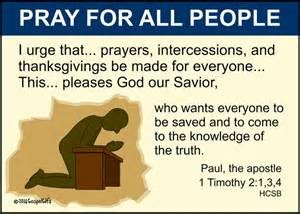 conscience. Then he proceeds to suggest how: First of all, I urge that supplications, prayers, intercessions, and thanksgivings be made…The Message Bible translation – which provided the title for today’s sermon – puts it this way, The first thing I want you to do is pray. Pray every way you know how, for everyone you know. The slightly nuanced differences between supplications, prayers, intercessions, and thanksgivings don’t really warrant separating them into discrete categories of prayer. It was the writer’s way of saying, pray every way you know how.
conscience. Then he proceeds to suggest how: First of all, I urge that supplications, prayers, intercessions, and thanksgivings be made…The Message Bible translation – which provided the title for today’s sermon – puts it this way, The first thing I want you to do is pray. Pray every way you know how, for everyone you know. The slightly nuanced differences between supplications, prayers, intercessions, and thanksgivings don’t really warrant separating them into discrete categories of prayer. It was the writer’s way of saying, pray every way you know how. life? Granted, God’s response in the conversation may take all kinds of delightful or terrifying forms, but that calls for the kind of discernment we only get by the act of prayer, by practicing to pray. Prayer is a conversation; it is being in a place of God-awareness. Keep the faith, Paul tells Timothy; hold on to faith by first of all praying.
life? Granted, God’s response in the conversation may take all kinds of delightful or terrifying forms, but that calls for the kind of discernment we only get by the act of prayer, by practicing to pray. Prayer is a conversation; it is being in a place of God-awareness. Keep the faith, Paul tells Timothy; hold on to faith by first of all praying.
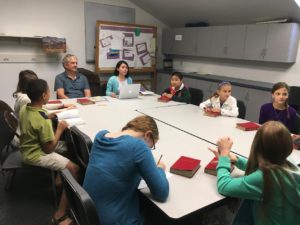

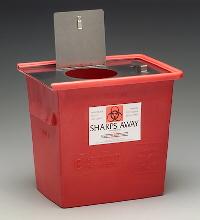
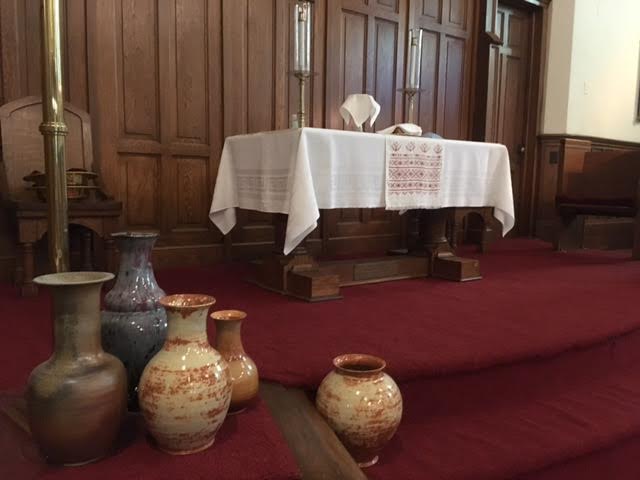 Everything went together yesterday, Sunday September 4, to tell a salvation story, that if we make a habit of looking for God, even if we do wrong, God will reshape us. The text from the lectionary was
Everything went together yesterday, Sunday September 4, to tell a salvation story, that if we make a habit of looking for God, even if we do wrong, God will reshape us. The text from the lectionary was  Sharing, where Mikaela Langdon, a
Sharing, where Mikaela Langdon, a 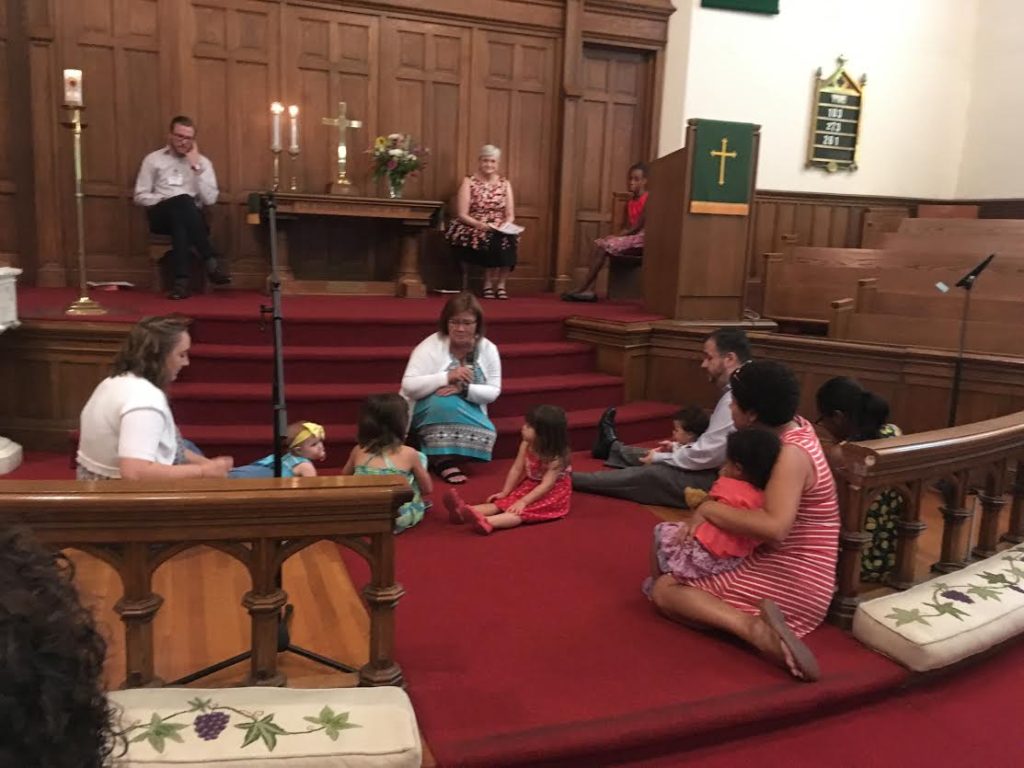
 Erik ‘Skitch’ Matson — our new youth pastor — will be in the pulpit on Sunday, August 14, to preach, based on
Erik ‘Skitch’ Matson — our new youth pastor — will be in the pulpit on Sunday, August 14, to preach, based on 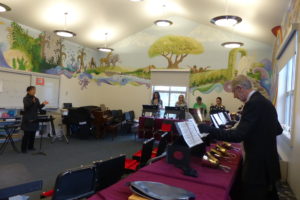 Just count one-two-three!
Just count one-two-three!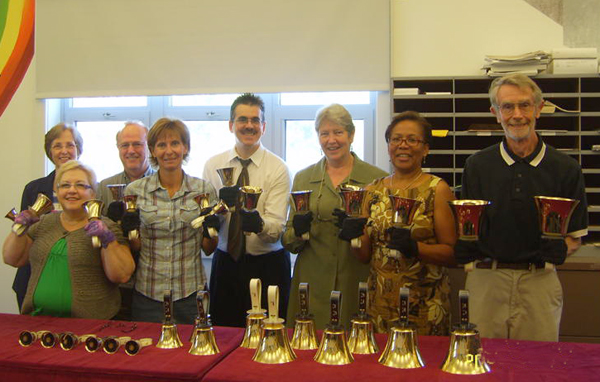




 Our society is mired in materialistic values. Thanks to the
Our society is mired in materialistic values. Thanks to the  That
That  I mean, these sayings, or teachings of Jesus talk about some rather difficult things: keeping all of
I mean, these sayings, or teachings of Jesus talk about some rather difficult things: keeping all of  That’s what gives me hope for the rebound when I find myself in situations that close me in, that back me into a corner, that knock the wind out of my sails as I take a hit from one of life’s deadly punches. It’s the properties of resurrection life that keep us persevering – not the promises of well-intentioned politicians; not the security of a tenured job; not the forecasts of the economic analysts; no – we, who are
That’s what gives me hope for the rebound when I find myself in situations that close me in, that back me into a corner, that knock the wind out of my sails as I take a hit from one of life’s deadly punches. It’s the properties of resurrection life that keep us persevering – not the promises of well-intentioned politicians; not the security of a tenured job; not the forecasts of the economic analysts; no – we, who are